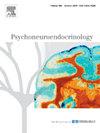精力充沛、注意力集中:将压力重新评估和成就目标结合起来的简短干预可以提高考试成绩,降低皮质醇
IF 3.4
2区 医学
Q2 ENDOCRINOLOGY & METABOLISM
引用次数: 0
摘要
考试的时候,感受到压力是很自然的,尤其是对于那些刚进入新学习环境的学生。那些将压力唤醒重新评估为一种功能资源并采用以方法为导向的成就目标的学生——专注于获得成功而不是避免失败——可能会经历更健康的生物压力反应,并表现得更好。本研究测试了与控制条件相比,整合压力重评和成就目标模型的短期干预是否提高了学生的考试成绩,2)降低了他们在课程考试中的压力激素。心理学导论课程学生(N = 308;年龄= 18.30岁,年龄= 0.62岁,59 %女性)在第一次和第二次课堂考试之间随机分配到短读写干预组或对照组。每次考试后,学生立即提供唾液样本,以评估考试时产生的皮质醇水平,考试成绩从课程讲师那里获得。结果显示,与对照干预相比,干预提高了考试成绩,并减少了干预后考试2时唾液皮质醇的产生。简而言之,短暂的干预是一个成功的工具,帮助学生将他们的压力反应视为专注于考试和表现的额外燃料。本文章由计算机程序翻译,如有差异,请以英文原文为准。
Fueled and focused: A brief intervention integrating stress reappraisal and achievement goals improves exam performance and reduces cortisol
When taking an exam, experiencing stress is natural, especially for students transitioning to new academic environments. Students who reappraise stress arousal as a functional resource and who adopt approach-oriented achievement goals —focusing on attaining success rather than avoiding failure— may experience healthier biological stress responses and perform better. This study tested whether a short intervention that integrated the stress reappraisal and achievement goal models 1) increased students’ exam scores and 2) decreased their stress hormones during their course exams compared to a control condition. Students in an Introduction to Psychology course (N = 308; Mage = 18.30 years, SDage = 0.62 years, 59 % Female) were randomly assigned to a short reading-writing intervention or a control condition between their first and second in-class exams. Students provided a saliva sample immediately after each exam to assess the cortisol levels produced while taking the exam, and exam scores were obtained from the course instructor. Results revealed that the intervention increased exam scores and decreased production of salivary cortisol at Exam 2 post-intervention compared to the control intervention. In brief, the short intervention was a successful tool in helping students view their stress responses as additional fuel to focus on the exam and perform.
求助全文
通过发布文献求助,成功后即可免费获取论文全文。
去求助
来源期刊

Psychoneuroendocrinology
医学-精神病学
CiteScore
7.40
自引率
8.10%
发文量
268
审稿时长
66 days
期刊介绍:
Psychoneuroendocrinology publishes papers dealing with the interrelated disciplines of psychology, neurobiology, endocrinology, immunology, neurology, and psychiatry, with an emphasis on multidisciplinary studies aiming at integrating these disciplines in terms of either basic research or clinical implications. One of the main goals is to understand how a variety of psychobiological factors interact in the expression of the stress response as it relates to the development and/or maintenance of neuropsychiatric illnesses.
 求助内容:
求助内容: 应助结果提醒方式:
应助结果提醒方式:


